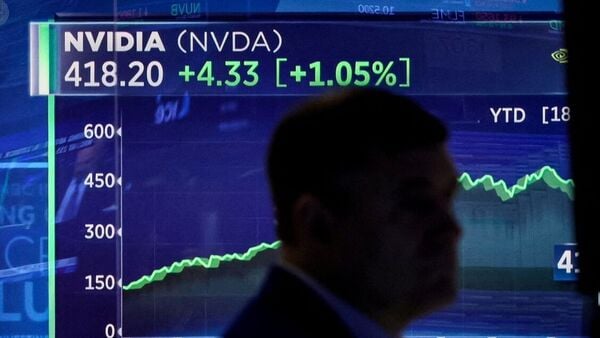Get ready for more AI mania this earnings season

Summary
Artificial intelligence-related stocks are set to deliver stellar second-quarter results, but the S&P 500 laggards need to catch up faster from here in order to meet the market’s expectations.Artificial intelligence is about to be the undisputed star of yet another earnings season. Looking further ahead, other performers will need to step up.
On Friday, Wall Street investment banks including JPMorgan Chase, Citi and Wells Fargo are expected to kick off second-quarter reporting with lackluster results. Median analyst forecasts suggest that U.S. lenders’ earnings per share were 10% smaller than a year earlier, according to FactSet.
But things should get better from there: The S&P 500 overall is expected to record a positive 8.8% figure. This would make it the best quarter for earnings growth since the January-to-March period of 2022, confirming that companies have left behind the period when inflation eroded profit margins.
In fact, the actual number will probably be even higher, accounting for executives’ tendency to guide expectations lower in order to beat them. Forecasts were downgraded much less than usual as the second quarter progressed, which, historically, has been linked with profits turning out better as well.
In a now-familiar pattern, though, it may not feel like a bumper earnings season, because the good news will likely come from just a few places. AI mania has dislocated the market.
In the second quarter, S&P 500 firms that should benefit directly from the technology are expected to increase their net income by a whopping 24% compared with the same period of 2023. Of the expected top 10 contributors to earnings growth, six are tech giants, including Meta Platforms, Alphabet, Amazon.com, Micron and Microsoft as well as AI-chip darling Nvidia. The non-AI side of the index is forecast to report income growth of just 1.5%.
This drives home an important point: Tech stocks aren’t just riding a wave of speculation; they are amassing actual riches from all the investment that is going into generative AI.
Among the laggards, banks benefited greatly from higher interest rates, and margins were always going to narrow from here. Other financial firms, such as insurers and asset managers, seem to have had a much better second quarter.
The gains are undeniably broadening. In previous quarters, profits rose even faster for AI-related companies, while declining for the rest. Only one out of 11 sectors in the S&P 500—materials, which includes the likes of steel producer Nucor—is projected to have experienced a fall in revenues in the April-to-June period, whereas three sectors were grappling with declining sales in the first quarter.
The catch-up is expected to continue, with “old economy" stocks delivering 12% year-over-year growth in net income in the fourth quarter—almost as much as the AI beneficiaries, where growth is forecast to cool. Investors can also derive some comfort from valuations, with the non-AI side of the S&P 500 trading at a lower price-to-earnings ratio than it did at the end of March. That points to fertile ground for stock picking.
The caveat is that this recovery trend is fragile. More than half the companies in the index are expected to report narrower profit margins for the second quarter than a year ago, with the real-estate sector being impacted the worst. Among industrial firms, aviation is still a dark spot because of the crisis at Boeing and the hit to low-cost carriers such as Southwest Airlines from more expensive labor and materials.
The macroeconomic outlook remains benign but is getting a bit more uncertain. Recent jobs reports point to a slowdown in the U.S. labor market, and consumers appear to be getting more cautious after a postpandemic shopping spree. The Federal Reserve could respond to this by cutting rates, but it is unclear how much this would help stocks given today’s high valuations. After all, higher borrowing costs haven’t significantly weighed on them this year.
AI may be all that investors need to stay positive this earnings season. After that, though, a solo act could start to disappoint.
Write to Jon Sindreu at jon.sindreu@wsj.com


